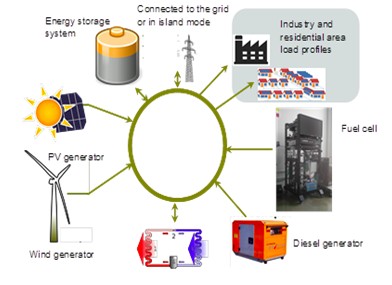A research and practical workshop.
143026, Moscow, Skolkovo Innovation Centre, Nobel Street, Building 3.
December 2, 2016
Skoltech Center for Energy Systems has started operation in 2014 and the aim of this workshop is to show the results of our research and officially open the Smart Grids laboratory. The Center has four main directions of research: smart grids, interacting energy infrastructures, markets and regulation and thermal devices. This workshop will concentrate on the first two areas. A more detailed description of the Center, its staff and research can be found at http://crei.skoltech.ru/energysystems/
The unique feature of the Center is its interdisciplinarity character whereby engineers work closely with mathematicians and physicists to make sure that mathematical breakthroughs and insights have practical meaning and can be applied by the industry in not too distant future. We work closely together with our foreign partners: Massachuesetts Institute of Technology (MIT, USA), California Insititute of Technology (Caltech, USA), Newcastle University (UK), and Russian partners: Moscow Power Engineering Institute (MPEI), V.A Trapeznikov Institute of Control Sciences of Russian Academy of Science, Melentyev Institute of Energy Systems of SB RAS (ESI).
The morning will be devoted to presentations outlining our main research achievements. They will cover methods for on-line security assessment, power system stability analysis, transmission expansion planning, optimal frequency control in future power systems, demand-side management, voltage control in distribution networks, and incentive mechanisms for integration of distributed generation into power system.
The afternoon will be devoted to opening of the Smart Grids laboratory during which there will time to discuss collaboration activities.
 The SmartGrid Lab offers the opportunity to test any device in a real microgrid. The installed facility includes: two simulated renewable generators which can be attached to real PV panels and to a wind turbine, a diesel generator, an energy storage system, active and reactive loads and several transmission lines. By using these renewable energy generators, we can test different kind of scenarios, so it is possible to size and to test a microgrid for several weather conditions just by setting the solar and wind generator profiles. The diesel generator works as a back-up systems as in grids for remote areas. The energy storage system is an important key of a microgrid that includes renewable energy generators. The SmartGrid Lab offers the possibility to simulate different kind of energy storage systems based on batteries or supercapacitors. Finally, the loads can simulate industry and residential area profiles, and the transmission lines allow us to test a distributed system.
The SmartGrid Lab offers the opportunity to test any device in a real microgrid. The installed facility includes: two simulated renewable generators which can be attached to real PV panels and to a wind turbine, a diesel generator, an energy storage system, active and reactive loads and several transmission lines. By using these renewable energy generators, we can test different kind of scenarios, so it is possible to size and to test a microgrid for several weather conditions just by setting the solar and wind generator profiles. The diesel generator works as a back-up systems as in grids for remote areas. The energy storage system is an important key of a microgrid that includes renewable energy generators. The SmartGrid Lab offers the possibility to simulate different kind of energy storage systems based on batteries or supercapacitors. Finally, the loads can simulate industry and residential area profiles, and the transmission lines allow us to test a distributed system.
Furthermore, the microgrid can be connected to the main grid or can work in island mode. On one hand, by working connected to the grid, it is possible to develop an energy management control and test it in the grid.
Thus, we can really estimate which is the amount of energy savings for a particular microgrid. On the other hand, by working in island mode, the SmartGrid lab offers the possibility to size and test the behavior of a grid for remote areas.
The workshop will be held mainly in Russian and for English presentations simultaneous translation will be provided.
Registration and administrative support: Viсtoria Godunova ( )
Tel: + 7 495 280 14 81 (ext. 3502)
